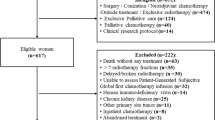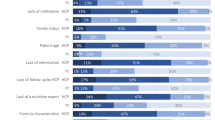Abstract
Objective: To evaluate the scored Patient-generated Subjective Global Assessment (PG-SGA) tool as an outcome measure in clinical nutrition practice and determine its association with quality of life (QoL).
Design: A prospective 4 week study assessing the nutritional status and QoL of ambulatory patients receiving radiation therapy to the head, neck, rectal or abdominal area.
Setting: Australian radiation oncology facilities.
Subjects: Sixty cancer patients aged 24–85 y.
Interventions: Scored PG-SGA questionnaire, subjective global assessment (SGA), QoL (EORTC QLQ-C30 version 3).
Results: According to SGA, 65.0% (39) of subjects were well-nourished, 28.3% (17) moderately or suspected of being malnourished and 6.7% (4) severely malnourished. PG-SGA score and global QoL were correlated (r=−0.66, P<0.001) at baseline. There was a decrease in nutritional status according to PG-SGA score (P<0.001) and SGA (P<0.001); and a decrease in global QoL (P<0.001) after 4 weeks of radiotherapy. There was a linear trend for change in PG-SGA score (P<0.001) and change in global QoL (P=0.003) between those patients who improved (5%) maintained (56.7%) or deteriorated (33.3%) in nutritional status according to SGA. There was a correlation between change in PG-SGA score and change in QoL after 4 weeks of radiotherapy (r=−0.55, P<0.001). Regression analysis determined that 26% of the variation of change in QoL was explained by change in PG-SGA (P=0.001).
Conclusion: The scored PG-SGA is a nutrition assessment tool that identifies malnutrition in ambulatory oncology patients receiving radiotherapy and can be used to predict the magnitude of change in QoL.
Sponsors: The Wesley Research Institute.
This is a preview of subscription content, access via your institution
Access options
Subscribe to this journal
Receive 12 print issues and online access
$259.00 per year
only $21.58 per issue
Buy this article
- Purchase on Springer Link
- Instant access to full article PDF
Prices may be subject to local taxes which are calculated during checkout
Similar content being viewed by others
References
Aaronson, NK, Ahmedzai, S, Bergman, B, Bullinger, M, Cull, A, Duez, NJ, Filiberti, A, Flechtner, H, Fleishman, SB & de Haes, JC (1993). The European Organization for Research and Treatment of Cancer QLQ-C30: a quality-of-life instrument for use in international clinical trials in oncology. J. Natl. Cancer Inst., 85, 365–376.
Andreyev, HJ, Norman, AR, Oates, J & Cunningham, D (1998). Why do patients with weight loss have a worse outcome when undergoing chemotherapy for gastrointestinal malignancies?. Eur. J. Cancer, 34, 503–509.
Baldwin, C, Parsons, T & Logan, S (2001). Dietary advice for illness-related malnutrition in adults. Cochrane Database Syst. Rev., 2, CD002008
Bauer, J, Capra, S & Ferguson, M (2002). Use of the scored Patient-Generated Subjective Global Assessment (PG-SGA) as a nutrition assessment tool in patients with cancer. Eur. J. Clin. Nutr., 56, 1–7.
Bjordal, K & Kaasa, S (1992). Psychometric validation of the EORTC Core Quality of Life Questionnaire, 30-item version and a diagnosis-specific module for head and neck cancer patients. Acta Oncol., 31, 311–321.
Coates, A, Porzsolt, F & Osoba, D (1997). Quality of life in oncology practice: prognostic value of EORTC QLQ-C30 scores in patients with advanced malignancy. Eur. J. Cancer, 33, 1025–1030.
Detsky, AS, McLaughlin, JR, Baker, JP, Johnston, N, Whittaker, S, Mendelson, RA & Jeejeebhoy, KN (1987). What is subjective global assessment of nutritional status?. J. Parenter. Enteral Nutr., 11, 8–13.
Evans, WK, Nixon, DW, Daly, JM, Ellenberg, SS, Gardner, L, Wolfe, E, Shepherd, FA, Feld, R, Gralla, R & Fine, S et al (1987). A randomized study of oral nutritional support versus ad lib nutritional intake during chemotherapy for advanced colorectal and non-small-cell lung cancer. J. Clin. Oncol., 5, 113–124.
Fayers, P, Aaronson, N, Bjordal, K & Sullivan, M (1999). EORTC QLQ-C30, Scoring Manual, Belgium: EORTC Data Center
Grant, M & Rivera, L (1994). Impact of dietary counselling on quality of life in head and neck patients undergoing radiation therapy. Qual. Life Res., 3, 77–78.
Hammerlid, E, Wirblad, B, Sandin, C, Mercke, C, Edstrom, S, Kaasa, S, Sullivan, M & Westin, T (1998). Malnutrition and food intake in relation to quality of life in head and neck cancer patients. Head Neck., 20, 540–548.
Hjermstad, MJ, Fossa, SD, Bjordal, K & Kaasa, S (1995). Test/retest study of the European Organization for Research and Treatment of Cancer Core Quality-of-Life Questionnaire. J. Clin. Oncol., 13, 1249–1254.
King, MT (1996). The interpretation of scores from the EORTC quality of life questionnaire QLQ-C30. Qual. Life Res., 5, 555–567.
Larsson, J, Akerlind, I, Permerth, J & Hornqvist, JO (1995). Impact of nutritional state on quality of life in surgical patients. Nutrition, 11, (2 Suppl) 217–220.
Niezgoda, HE & Pater, JL (1993). A validation study of the domains of the core EORTC quality of life questionnaire. Qual. Life Res., 2, 319–325.
Nitenberg, G & Raynard, B (2000). Nutritional support of the cancer patient: issues and dilemmas. Crit. Rev. Oncol. Hematol., 34, 137–168.
Ohrn, KE, Sjoden, PO, Wahlin, YB & Elf, M (2001). Oral health and quality of life among patients with head and neck cancer or haematological malignancies. Support. Care Cancer, 9, 528–538.
Ollenschlager, G, Viell, B, Thomas, W, Konkol, K & Burger, B (1991). Tumor anorexia: causes, assessment, treatment. Rec. Results Cancer Res., 121, 249–259.
Osoba, D, Rodrigues, G, Myles, J, Zee, B & Pater, J (1998). Interpreting the significance of changes in health-related quality-of-life scores. J. Clin. Oncol., 16, 139–144.
Ottery, FD (1996b). Definition of standardized nutritional assessment and interventional pathways in oncology. Nutrition, 12, (Suppl 1) S15–S19.
Ottery, F (2000). Patient-Generated Subjective Global Assessment. In:The Clinical Guide to Oncology Nutrition, ed. P McCallum & C Polisena Chicago, IL: American Dietetic Association pp11–23.
Ottery, F, Bender, F & Kasenic, S (2002). The design and implementation of a model of nutritional oncology program. Oncol. Iss., 17, (2 Suppl) 3–8.
Ovesen, L, Hannibal, J & Mortensen, EL (1993). The interrelationship of weight loss, dietary intake, and quality of life in ambulatory patients with cancer of the lung, breast, and ovary. Nutr. Cancer, 19, 159–167.
Persson, C, Sjoden, PO & Glimelius, B (1999). The Swedish version of the patient-generated subjective global assessment of nutritional status: gastrointestinal vs urological cancers. Clin. Nutr., 18, 71–77.
Rivadeneira, DE, Evoy, D, Fahey, TJ III, Lieberman, MD & Daly, JM (1998). Nutritional support of the cancer patient. Cancer J. Clin., 48, 69–80.
Sanders, C, Egger, M, Donovan, J, Tallon, D & Frankel, S (1998). Reporting on quality of life in randomised controlled trials: bibliographic study. Br. Med. J., 317, 1191–1194.
Shike, M (1996). Nutrition therapy for the cancer patient. Hematol. Oncol. N. Am., 10, 221–234.
Small, W, Carrara, R, Danford, L, Logemann, J & Cella, D (2002). Quality of life and nutrition in the patient with cancer. Oncol. Iss., 17, (2 Suppl) 15–16.
Tchekmedyian, NS, Zahyna, D, Halpert, C & Heber, D (1992). Assessment and maintenance of nutrition in older cancer patients. Oncology (Huntington), 6, (2 Suppl) 105–111.
van Bokhorst-de van der, S, van Leeuwen, PA, Kuik, DJ, Klop, WM, Sauerwein, HP, Snow, GB & Quak, JJ (1999). The impact of nutritional status on the prognoses of patients with advanced head and neck cancer. Cancer, 86, 519–527.
Acknowledgements
The authors would like to thank Dr Diana Battistutta for statistical advice.
Author information
Authors and Affiliations
Rights and permissions
About this article
Cite this article
Isenring, E., Bauer, J. & Capra, S. The scored Patient-generated Subjective Global Assessment (PG-SGA) and its association with quality of life in ambulatory patients receiving radiotherapy. Eur J Clin Nutr 57, 305–309 (2003). https://doi.org/10.1038/sj.ejcn.1601552
Received:
Revised:
Accepted:
Published:
Issue Date:
DOI: https://doi.org/10.1038/sj.ejcn.1601552
Keywords
This article is cited by
-
Nutritional status and quality of life among breast Cancer patients undergoing treatment in Addis Ababa, Ethiopia
BMC Women's Health (2023)
-
Malnutrition risk and frailty in head and neck cancer patients: coexistent but distinct conditions
European Archives of Oto-Rhino-Laryngology (2023)
-
A hospital-based therapeutic food pantry study for people living with cancer in New Orleans
Supportive Care in Cancer (2023)
-
A poorer nutritional status impacts quality of life in a sample population of elderly cancer patients
Health and Quality of Life Outcomes (2021)
-
Optimization of nutrition support practices early after hematopoietic cell transplantation
Bone Marrow Transplantation (2021)



